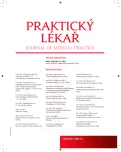-
Medical journals
- Career
Psychological aspects of malignant vasovagal syncopes
Authors: V. Netík 1; D. Skorunka 2
Authors‘ workplace: Terapeutické centrum v Jihomoravském kraji, Brno Přednosta: MUDr. Jiří Dolák 1; Univerzita Karlova v Praze, Lékařská fakulta v Hradci Králové Ústav sociálního lékařství Přednosta: doc. MUDr. Svatopluk Býma, CSc. 2
Published in: Prakt. Lék. 2015; 95(6): 272-275
Category: Of different specialties
Overview
Vasovagal syncope is among the most common forms of physiological reflex based syncopes. Syncope is a sudden and transitory loss of consciousness on vasovagal basis. Its prevalence is estimated 3% in men and 3.5% in women. Almost one third of patients with the diagnosis suffer from an atypical form of vasovagal syncope called malignant vasovagal syncope (MVVS). In the paper, various aspects of this subtype are discussed. We focus primarily on psychological and so called psychosomatic aspects including psychiatric comorbidities, which occur frequently in patients with MVVS. We also describe the impact of the disease on quality of life of those patients.
Keywords:
malignant vasovagal syncope – psychological aspects – quality of life – therapy
Sources
1. Alboni P. Therapy of vasovagal syncope: to prevent the vasovagal reflex or to treat the impending reflex. Europace 2009; 6 : 776–778.
2. Bedard F, Marchand A, Kus T, D’Antono B. Vasovagal syncope and unexplained syncope: Concepts, treatments, and future perspectives. Can Psychol 2010; 51 : 257–268.
3. D’Antono B, Dupuis G, St-Jean K, et al. Prospective evaluation of psychological distress and psychiatric morbidity in recurrent vasovagal and unexplained syncope. J Psychosom Res 2009; 67(3): 213–222.
4. Flint B, Baker C, Freeston M, Newton JL. Level of psychosocial impairment predicts early response to treatment in vasovagal syncope. Europace 2008; 11(2): 231–236.
5. Gaynor D, Egan J. Vasovagal syncope, the common faint – what clinicians need to know. The Irish Psychologist 2011; 37(7): 178–179.
6. Goldemund D, Goldemund K. Synkopy, klasifikace, etiopatogeneze. Pediatrie pro praxi 2002; 1 : 6–9.
7. Gracie J, Baker Ch, Freeston MH, Newton JL. The role of psychological factors in the aetiology and treatment of vasovagal syncope. Indian Pacing Electrophysiol J 2004; 4(2): 79–84.
8. Grubb B. Neurocardiogenic syncope and related disorders of orthostatic tolerance. Circulation 2005; 111(22): 2997–3006.
9. Hartl P, Hartlová H. Psychologický slovník. Praha: Portál 2000.
10. Charon R. Narrative medicine; honoring the stories of illness. Oxford: OUP 2008.
11. Kapoor WN, Foruanto M, Hanusa BH, Schulberg HC. Psychiatric illnesses in patients with syncope. Am J Med 1995; 99 : 505–512.
12. Kolmáš P, Štípal R, Pešatová S, Hrabovská Z. Vazovagální synkopa – neměnná klinická jednotka? Interní Med 2002; 2 [online]. Dostupné z: www.solen.cz/pdfs/int/2002/02/10.pdf [cit. 2015-03-26].
13. Linzer M, Pontinen M, Gold DT, et al. Impairment of physical and psychosocial functioning in recurrent syncope. J Clin Epidemiol 1991; 44 : 1037–1044.
14. Linzer M, Gold DT, Pontinen M. Recurrent syncope as a chronic disease: preliminary validation of a disease specific measure of functional impairment. J Gen Intern Med 1994; 9 : 181–186.
15. Newton JL, Kenny RA, Baker CR. Cognitive behavioural therapy as a potential treatment for vasovagal/neurocardiogenic syncope-a pilot study. Europace 2003; 5 : 299–301.
16. Parry SW, Kenny RA. The management of vasovagal syncope. QJM 1999; 92 : 697–705.
17. Reybrouck T, Heidbuechel H, van de Werf H, Ector H. Tilt training: a treatment for malignant and recurrent neurocardiogenic syncope. Pacing Clin Electrophysiol 2000; 23(4): 493–498.
18. Rose MS, Koshman ML, Spreng S, Sheldon R. The relationship between health-related quality of life and frequency of spells in patients with syncope. J Clin Epidemiol 2000; 53(12): 1209–1216.
19. Shaffer C, Jackson L, Jarecki S. Characteristics, perceived stressors and coping strategies of patients who experience neurally mediated syncope. Heart Lung 2001; 30(4): 244–245.
20. Skorunka D. Narativní perspektiva v medicíně. Prakt. Lék. 2012; 92(7): 383–389.
21. Skorunka D. Psychoterapeutický přístup v medicíně. Prakt. Lék. 2011; 91(12): 718–722.
22. White M, Epston D. Narrative means to therapeutic ends. New York: Norton 1990
Labels
General practitioner for children and adolescents General practitioner for adults
Article was published inGeneral Practitioner

2015 Issue 6-
All articles in this issue
- Betaglucans – immunomodulatory substances in prevention and support treatment
- Gastric surgery at present
- Malignant tumours – strategy and preventive programmes in the Czech Republic
- Opinions and attitudes of Czech citizens on the issue of health and healthy lifestyles
- How to fulfil a legal duty to inform patient writing his/her previous expressed wish?
- Commission health assessment by medical assessor committees
- Psychological aspects of malignant vasovagal syncopes
- Changes in body composition and eating habits of obese patients after intragastric balloon insertion
- The reliability of the Czech version of the General-Food Craving Questionnaire-Trait
- Patient with abdominal aortic aneurysm – diagnostics, follow-up and treatment in the ambulance of general practitioner
- General Practitioner
- Journal archive
- Current issue
- Online only
- About the journal
Most read in this issue- Gastric surgery at present
- Betaglucans – immunomodulatory substances in prevention and support treatment
- Commission health assessment by medical assessor committees
- Patient with abdominal aortic aneurysm – diagnostics, follow-up and treatment in the ambulance of general practitioner
Login#ADS_BOTTOM_SCRIPTS#Forgotten passwordEnter the email address that you registered with. We will send you instructions on how to set a new password.
- Career

